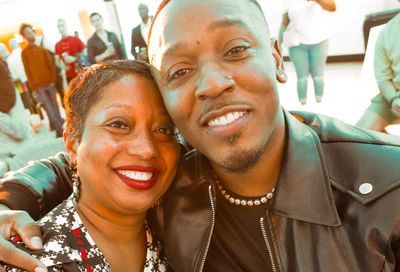Betsy DeVos: States should decide if schools taking taxpayer money can discriminate
Education Secretary would not commit to prohibiting private schools from discriminating against LGBTQ students

Betsy DeVos artfully dodged questions from members of Congress about whether schools that receive taxpayer money in the form of vouchers should be allowed to discriminate against LGBTQ students.
DeVos appeared before the House Appropriations Subcommittee on Labor, Health and Human Services, and Education on Wednesday to testify about a proposal in President Trump’s budget.
That budget sets aside $1 billion for school districts that promote school choice, increases funding for charter school grants, and invests millions into scholarship programs that allow low-income students to attend private schools, reports the Detroit Free Press.
During her testimony, DeVos was questioned by congressional Democrats about whether she would intervene to stop a private school receiving voucher money from discriminating against students. The Education Secretary frequently went back to her talking points, emphasizing that states should write their own laws deciding whether private schools accepting vouchers should be allowed to discriminate based on their religious beliefs or tenets.
U.S. Rep. Katherine Clark (D-Mass.) used the example of a private, Christian school in Indiana whose student handbook states that students whose homelife includes “homosexual or bisexual activity” or “alternate gender identity” may be denied admission. Clark said the school received $665,000 through a state voucher program.
Clark then asked DeVos if she would require that school to open up admission to all students if it applied for federal funding through the voucher program.
DeVos refused to answer the question directly, saying that parents should have the right to make decisions about their own children’s education.
“So, if I understand your testimony … there’s no situation of discrimination or of exclusion that, if a state approved it for its voucher program, that you would step in and say: ‘That is not how we’re going to use our federal dollars?'” Clark asked.
“I go back to, the bottom line is, we believe the parents are the best equipped to make choices for their children’s schooling and education decisions,” DeVos said. “And too many children today are trapped in schools that do not work for them. We have to do something different. We have to do something different than continuing a top-down, one-size-fits-all approach, and that is the focus. States and local communities are best equipped to make these decisions and framework.”
“I am shocked that you cannot come up with one example of discrimination that you would stand up for students,” Clark responded.
U.S. Rep. Barbara Lee (D-Calif.) told DeVos she thought it was “outrageous” for her to say “it’s OK if parents and local communities discriminate.”
But DeVos replied that she was not suggesting that students shouldn’t have protections or be allowed to pursue their education without fear of harassment.
“The department is going to continue to investigate any complaints or any issues surrounding allegations of discrimination,” DeVos said. “We have no proposal to change any of that. So, as we talk about states assuming more authority and flexibility in how they implement their programs for students, nothing about that changes our desire to ensure that students have a safe and secure environment.”
Eliza Byard, the executive director of GLSEN, which advocates for pro-LGBTQ policies in schools, called it “appalling” that DeVos could not name an instance in which a school that discriminates against prospective students would be denied federal funds.
“Equality of opportunity for every child is a bedrock American commitment,” Byard said in a statement. “Any betrayal of this commitment in the name of ‘states’ rights’ and ‘local control’ is a shameful stain on our society and the antithesis of true education leadership.”
“Discrimination of any kind against students has no place in publicly-funded schools or programs,” added Nathan Smith, GLSEN’s director of public policy. “The U.S. Department of Education itself is charged by Congress with civil rights enforcement responsibilities , and has a vital role to play in stepping up for students who lack the voice or resources to stand up for themselves.”
Support Metro Weekly’s Journalism
These are challenging times for news organizations. And yet it’s crucial we stay active and provide vital resources and information to both our local readers and the world. So won’t you please take a moment and consider supporting Metro Weekly with a membership? For as little as $5 a month, you can help ensure Metro Weekly magazine and MetroWeekly.com remain free, viable resources as we provide the best, most diverse, culturally-resonant LGBTQ coverage in both the D.C. region and around the world. Memberships come with exclusive perks and discounts, your own personal digital delivery of each week’s magazine (and an archive), access to our Member's Lounge when it launches this fall, and exclusive members-only items like Metro Weekly Membership Mugs and Tote Bags! Check out all our membership levels here and please join us today!























You must be logged in to post a comment.